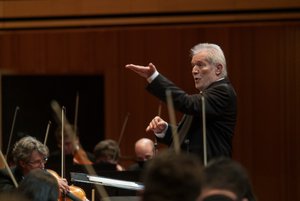WAGNER: Siegfried-Idyll
PETER EÖTVÖS: Respond – Hungarian premiere
- intermission -
IVES: Symphony No. 4
Máté Szűcs viola, Péter Kiss piano, ELTE Béla Bartók Choir
Concerto Budapest
Conductor: Péter Eötvös, Gergely Dubóczky

A birthday gift composed for small ensemble by Richard Wagner who generally thought in terms of symphony orchestra, the viola concerto by Péter Eötvös rearranged for reduced line-up with solo by Máté Szűcs, and the symphony by Charles Ives employing two conductors composed for grand orchestra and performed in Hungary only once before. All this is in the Concerto Budapest concert under the baton of Péter Eötvös, during which proof is given that as regards musical quality, size is not a consideration.
On Christmas Day 1870, Richard Wagner awakened Cosima, whose birthday it was, with music, providing a morning serenade with small ensemble at the door to the bedroom of his wife: Siegfried Idyll parades key themes from the third act of the opera, including the melody accompanying the awakening of Brünnhilde, Siegfried’s horn signal, and the song of the forest bird – instead of drama, pure tranquillity and equilibrium. Similarly to the Wagner work, Péter Eötvös’s cello concerto Respond is a reworking of an earlier composition, which is being performed in its current form for the first time in Hungary. Eötvös rearranged his 1998 creation Replica in accordance with the pandemic: this resulted in the 49-member orchestra being reduced to 32 musicians, and parallel with this the work has been expanded with new musical concepts. With regard to the viola concerto that has multiple associations with his opera Tri sestry (Three Sisters), and its title, the composer had the following to say: “Answers only serve to raise further questions. In the dialogue thus created, a wide variety of arguments are made, and like shards of a shattered mirror one receives the reflection of an image whose original can only be guessed at.” Likewise, the music of American Charles Ives can be compared to virtually nothing else. The composer who made a living as an insurance agent went his own way and his innovations put him ahead of his time. From 1910 and for nearly 15 years, the experimental composer worked on his most complex piece, Symphony No. 4; however, the complicated work calling on the resources of a large orchestra was first heard in its entirety only in 1965. It has never been performed in Müpa, and the last concert in Budapest is dated back to 2001, also under the baton of Péter Eötvös, so the Concerto Budapest concert promises to be the occasion for a thrilling discovery (or for some, a reacquaintance).
